K-State Current
K-State Current - March 23, 2022
K-State Current is a weekly news update for the Kansas Board of Regents to apprise the Regents on a few of the many successes and achievements made by K-State faculty, staff, and students.

K-State News
Summer programs encourage Native, Indigenous, tribal and rural Kansas students to experience veterinary medicine
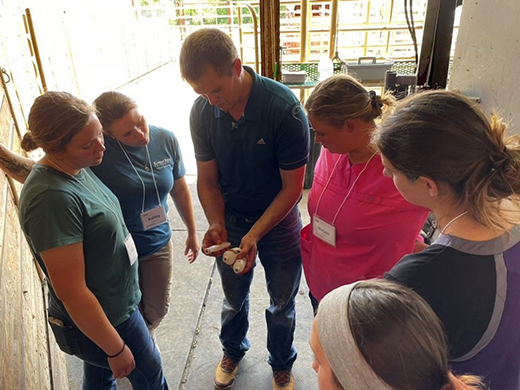 Veterinarian Brady Luke at Solomon Valley Veterinary Hospital in Beloit shows prospective veterinary students in the SPARK program a few items typically used in the field by cattle veterinarians.
Veterinarian Brady Luke at Solomon Valley Veterinary Hospital in Beloit shows prospective veterinary students in the SPARK program a few items typically used in the field by cattle veterinarians.
For the second year, the College of Veterinary Medicine at Kansas State University offers two summer opportunities for future veterinarians: SPARK, the Summer Program for Aspiring Rural Kansas veterinarians, and SPRINTS, the Specialized Programs for the Recruitment of Indigenous, Native and Tribal Students initiative.
SPARK creates direct and purposeful connections between aspiring veterinarians and veterinary practices in rural communities throughout Kansas. The daylong immersive experience provides participants with the opportunity to shadow veterinarians in rural communities in order to gain exposure to the demands and rewards of rural veterinary practice. The goal of the program is to generate long-term interest in a career in rural veterinary medicine. Additionally, SPARK participants will engage in consultation sessions to learn how to create a competitive application for a selective Doctor of Veterinary Medicine program.
Ideal applicants for the SPARK program are those who intend to apply for admission to a Doctor of Veterinary Medicine program during the 2022-2023 application cycle and are within five years of attaining a veterinary medicine degree; however, applicants outside of that criteria are welcome to apply as well. To apply, go to kstate.qualtrics.com/jfe/form/SV_3CVGJQyBuMKIrd4.
The SPRINTS initiative provides opportunities for high school and college students who identify as tribal, Native American or Indigenous to gain exposure to veterinary medicine as a potential career path. The initiative encompasses many opportunities for participants, including sponsorships for registration, travel and lodging costs to attend Vet Med ROCKS, an annual summer camp hosted by K-State's College of Veterinary Medicine. SPRINTS participants will also receive a faculty and student mentor in the college to help prepare for and apply to Doctor of Veterinary Medicine programs. Additionally, participants will receive tailored consultations from admissions staff about the application process and fee waivers for their application to K-State's Doctor of Veterinary Medicine program.
Ideal applicants for the SPRINTS initiative are high school and undergraduate college students, at least 18 years of age, who identify as Indigenous, Native American or tribal, and with a desire to learn more about careers in veterinary medicine. To apply, go to kstate.qualtrics.com/jfe/form/SV_cGZJAV5Vvv3SmEK.
The deadline to apply for both programs is Friday, May 6. Questions about these programs can be directed to admit@vet.k-state.edu.
K-State Faculty Highlights
Stu Duncan recognized as 2022 Cotton Specialist of the Year
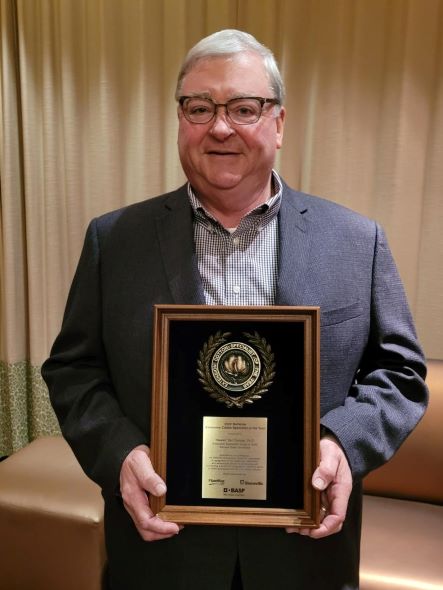 Stewart "Stu" Duncan was named the 2022 Cotton Specialist of the Year during an awards ceremony held earlier this year. The ceremony was held in conjunction with the Beltwide Cotton Conference in San Antonio.
Stewart "Stu" Duncan was named the 2022 Cotton Specialist of the Year during an awards ceremony held earlier this year. The ceremony was held in conjunction with the Beltwide Cotton Conference in San Antonio.
The prestigious award, voted on by cotton specialists in the 17 states where cotton is grown, is given to one individual each year and is based on multiple considerations including exceptional leadership and outstanding industry service. The award is sponsored by BASF.
A lifelong Kansan, Duncan earned his bachelor's, master's and doctoral degrees in agronomy from K-State. During his university career, he provided leadership for all types of crop production and environmental protection practices. He helped develop the state's cotton production system and affiliated industry, including cottonseed processing and use, cropping systems demonstrations and research. He retired in 2021 following 40 years of professional service.
"I am extremely pleased to see Stu recognized by his peers as Cotton Specialist of the Year," said Steve Nichols, BASF agronomic services manager, cotton. "Stu has always been highly engaged in agriculture throughout his career and has demonstrated a passion for cotton and the cotton industry. I appreciate the many contributions he has made over the years and I’m proud to call him a friend."
K-State researcher aims to reduce risk of lead exposure in Kansas City area
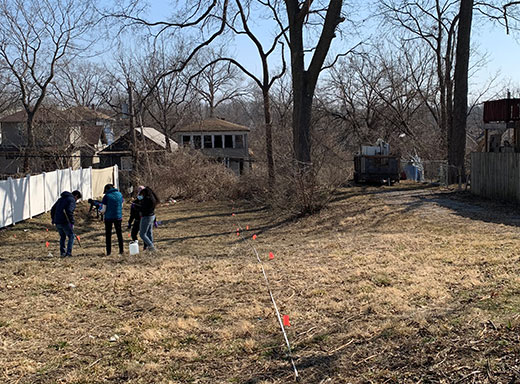
A Kansas State University researcher is embarking on a study that could help to reduce the risk of lead in soil around homes and vacant city lots.
Ganga Hettiarachchi, a professor of soil and environmental chemistry in the university’s Department of Agronomy, recently received a three-year grant for $700,000 from the U.S. Department of Housing and Urban Development (HUD) to reduce human exposure to lead in soil, especially among children under age 6.
Most of the work will be done in neighborhoods around Kansas City, including up to a dozen Brownfield sites, or land previously developed that is no longer in use and has known or suspected contamination.
“People think soil chemistry is basic science, and most of the time it is,” Hettiarachchi said. “But in this case, it is basic science that can be applied to public health.”
According to information from the U.S. Centers for Disease Control, exposure to even low levels of lead can cause damage over time, especially to children. Lead exposure can stunt childhood brain development, as well as cause damage to the brain and nervous system in children and adults, among other health risks.
The Missouri Department of Health and Senior Services reports that lead-based paint and contaminated dust are the most common sources of exposure in the United States. Soil often becomes contaminated from natural weathering of exterior-based paint from houses and other structures. Areas around houses built before 1978 – when lead-based paint was banned -- are more susceptible to lead contamination.
Hettiarachchi said basic soil chemistry – for example, adding phosphorus sources to soil, or applying mulch or wood bark in home landscapes – could be key to immobilizing or reducing direct exposure to lead and other contaminants in soil.
“In Kansas City, we have a lot of Brownfields in neighborhoods where we suspect high lead levels,” Hettiarachchi said. “Initially, we will screen a large number of lots and then depending on their soils and levels of lead, we will pick 10-12 sites to study further.”
Hettiarachchi’s research team will build test plots in each area and apply soil amendments to determine the best way to decrease the so-called bioavailability of lead to children and adults.
She said the team also will apply soil amendments to select residential sites to evaluate the potential benefits of immobilizing soil lead in its original place, known as in situ stabilization.
“To our knowledge, there are no studies evaluating the benefits of adding in situ stabilization methods to current state and local lead poisoning mitigation programs,” Hettiarachchi said. “We anticipate that the findings from this study will improve the current practices adopted by the CDC’s Childhood Lead Poisoning Prevention program around the nation.”
David Rosowsky, K-State’s vice president for research, lauded the project: “Dr. Hettiarachchi’s study is an excellent example of how research that is being done at K-State is being applied to directly improve the lives and health of people in our state and around the world,” he said.
In 2021, the CDC estimated more than 500,000 U.S. children under age 6 have blood lead levels higher than 5 micrograms per deciliter, the level at which recommended public health actions be initiated.
Recently, the CDC changed the recommendation to 3.5 micrograms per deciliter, even though public health officials agree that no amount of lead is safe for children.
“If we can find ways to reduce bioavailability of lead in these mildly contaminated soils in situ, I think that can be really beneficial for human health, and especially for children,” Hettiarachchi said.
She adds: “Working with the Environmental Protection Agency and HUD better positions this project for successful outcomes, and what excites me is the potential to replicate these results in other cities across the country. Simply stated, Kansas City could be a model city.”
Hettiarachchi has formed partnerships with the Kansas City (Mo.) Health Department and its Brownfields program; Children’s Mercy Hospital; and the EPA’s National Risk Management Research Laboratory in Cincinnati, in addition to HUD.
More information on the Kansas City (Mo.) lead testing program is available online from the Kansas City Department of Health.
Flinchbaugh remembered for service to agriculture, U.S. land-grant system
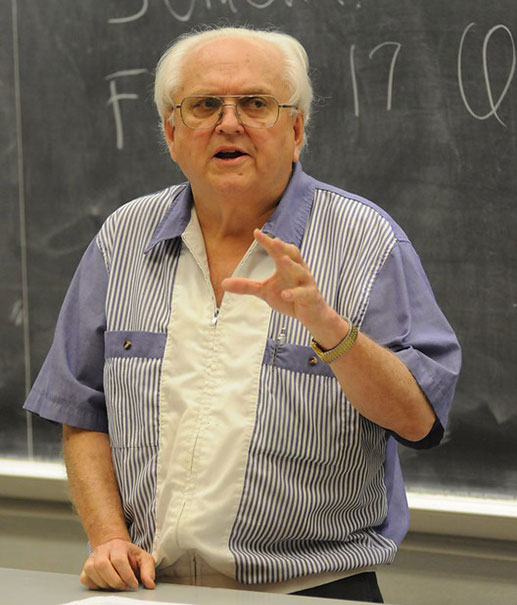 A national grassroots organization that supports agricultural research, extension and teaching has granted one of its top honors to Barry Flinchbaugh, a world-renowned agricultural economist and Kansas State University College of Agriculture professor.
A national grassroots organization that supports agricultural research, extension and teaching has granted one of its top honors to Barry Flinchbaugh, a world-renowned agricultural economist and Kansas State University College of Agriculture professor.
The Council for Agricultural Research, Extension and Teaching (CARET) recognized Flinchbaugh posthumously with the Meritorious Service to CARET award, which recognizes those who have made significant contributions to enhance the national support and understanding of the land-grant university system.
Flinchbaugh was well known as one of the country’s leading experts on agricultural policy and agricultural economics. For more than four decades, he was a top advisor to politicians of both major political parties, including Secretaries of Agriculture, chairs of the House and Senate Agriculture committees, and numerous senators and state governors.
He was involved to some degree in every U.S. Farm Bill written since 1968 and served on many national boards, advisory groups and task forces, providing input on domestic food and agricultural policy.
Flinchbaugh served as chair of the Commission on 21st Century Production Agriculture, which was authorized in the 1996 Federal Activities Inventory Reform (FAIR) Act, also known as the Freedom to Farm Act.
Since coming to Kansas State University in 1971, Flinchbaugh taught a 400-level course in agricultural policy and served as an agricultural economist for extension. He taught more than 5,000 students, and his former students include governors, members of the house and senate, staff for agricultural trade organizations, lobbyists, professors, deans, county commissioners and school board members.
He is remembered for his impactful storytelling style and his tremendous commitment to his students and those he served throughout the state.
Until his death in November 2020, Flinchbaugh received approximately 100 speaking invitations a year and authored 100-plus publications, including an agricultural policy textbook.
The presentation of the Meritorious Service to CARET Award was made during the 2022 Joint CARET/AHS annual meeting on March 6-9.
CARET stands for the Council for Agricultural Research, Extension and Teaching. AHS is an acronym for Administrative Heads Section, which is a unit of the Association of Public and Land-grant Universities’ Commission on Food, Environment, and Renewable Resources.
K-State Student News
Royal Purple Yearbook wins national Pacemaker Award
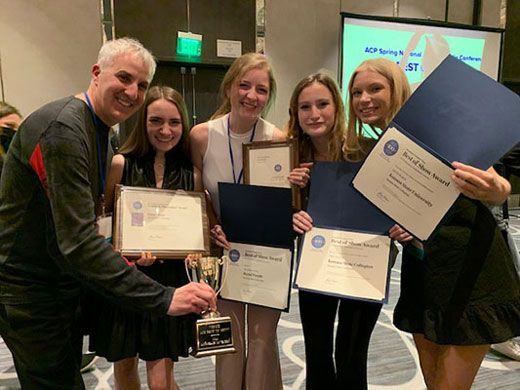 Collegian Media Group Director David Levy celebrates with the editors and staff of the Royal Purple yearbook and Collegian student newspaper for winning Best Yearbook in the country and Best Newspaper website at the Associated Collegiate Press annual conference in Long Beach, California, on March 5. From left: Levy; Royal Purple Editor-in-Chief Hallie Everett; Royal Purple Photo Editor Macey Franco; Collegian reporter Maggie Latenser; and, Collegian Copy Chief Kelsey Volk.
Collegian Media Group Director David Levy celebrates with the editors and staff of the Royal Purple yearbook and Collegian student newspaper for winning Best Yearbook in the country and Best Newspaper website at the Associated Collegiate Press annual conference in Long Beach, California, on March 5. From left: Levy; Royal Purple Editor-in-Chief Hallie Everett; Royal Purple Photo Editor Macey Franco; Collegian reporter Maggie Latenser; and, Collegian Copy Chief Kelsey Volk.
The 2021 Royal Purple yearbook wins the national Pacemaker Award for best college yearbook in the country. The Pacemaker is considered the Pulitzer of college journalism.
In fall 2021, from among entries across the country, the Associated Collegiate Press announced the 2021 Royal Purple as one of seven finalists in the competition.
The Royal Purple is a publication of the Collegian Media Group, which also publishes the Collegian student newspaper and Manhappenin' lifestyle magazine.
"Students don't need experience to get involved," said David Levy, Collegian Media Group director. "The growth in skill happens as you go. We train students along their personal path to excellence."
Co-Editor-in-Chiefs Hallie Everett and Katie Harbert led around 20 student writers, photographers, page designers and copy editors toward realizing their fullest potential. Everett, who now serves as the editor-in-chief for the 2022 yearbook, received the honor at the Associated Collegiate Press National Collegiate Press conference in Long Beach, California, on March 5. It's the first in-person conference in two years because of the pandemic.
"The honor of receiving a Pacemaker is always special, but receiving it in person was especially memorable," Everett said. "We could not be more proud of our staff for taking on this yearbook during a challenging year."
"Winning a Pacemaker award is a testament to the hard work and talent of the Royal Purple staff and its dedication to authentically telling the stories of student life during an unprecedented time in K-State history," said John Walter, who advised the Royal Purple staff between fall 2019 through December 2021. "The students' dedication and attention to detail resulted in the best college yearbook in the nation, continuing the long legacy of award-winning work that the Royal Purple is known for."
Gary Lundgren, associate director and coordinator of the Pacemaker competitions, said a winning yearbook Pacemaker delivers engaging verbal and visual stories, showcasing superior photojournalism, writing and design.
The Collegian newspaper staff also won an award for Best News Website in the conference's Best of Show competition among universities with 10,000 students or more. Levy said the beauty is that all three Collegian Media Group publications are produced by students from all academic disciplines, not just journalism.
"No matter what your field of study, the leadership and team-building skills, awards, published work and a host of other benefits are exactly what employers and internship coordinators look for when hiring," Levy said. "I welcome everyone to join us and participate in continuing the legacy of these award-winning publications."